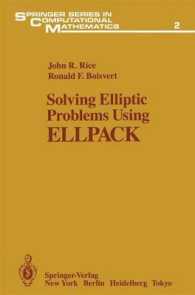Full Description
This book shines a light on the practices and professional identities of translators in nineteenth-century France, speaking to the translatorial turn in translation studies which spotlights translators as active agents in the international circulation of texts.
The volume charts the sociocultural, legal, and economic developments which paved the way for the development of the professional translation industry in France in the period following the French Revolution through to the First World War. Drawing on archival material from French publishers, institutional archives, and translators' own discourses, and applying historiographical methodologies, Pickford explores the working conditions of professional translators during this time and the subsequent professional identities which emerged from the collective practice of translation across publishing, business, and government. In its diachronic approach to translators' practices and identities, the book aims to recover the collective contributions of these translators and, in turn, paves the way for a new approach to "translator history from below".
The volume will appeal to students and scholars in translation studies, particularly those with an interest in literary translation, translation history, and translator practices.
Contents
Introduction
1 The Emergnce of a Mass Market for Translation
2 Tracing an Emergent Discourse of Translatorial Labour
3 Tracing Translators in Publishers' Archives
4 Developing a Legal Framework for the Nineteenth-Century French Literary Translation Market
5 The Economic Lives of Nineteenth-Century Women Translators
6 The Life and Career of Auguste-Jean-Baptiste Defauconprêt, Inventor of the "Lingual Steam Engine"
Coda
Appendix: Translators and Transactions in the Institut mémoires de l'édition contemporaine archives








